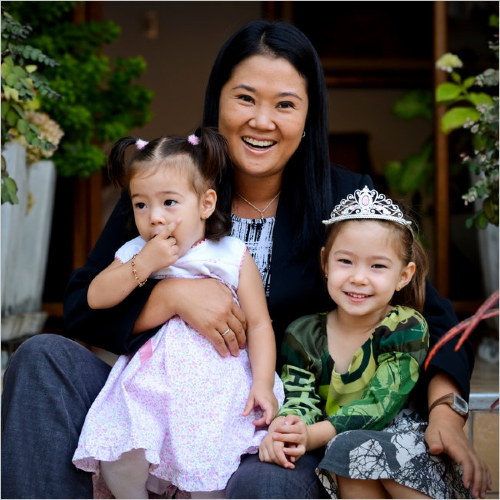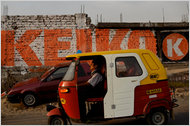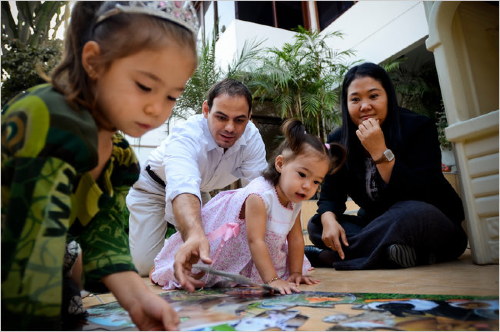
(above) "I reject and lament the errors and crimes that were committed by officials in my father's government." KEIKO FUJIMORI Photo: Meridith Kohut for The New York Times
 Slideshow: A Candidate Fights a Contested Legacy in Peru
Slideshow: A Candidate Fights a Contested Legacy in Peru
A Second Fujimori Contends for Peru's Presidency
May 27, 2011 - NY Times
By SIMON ROMERO
KEIKO FUJIMORI'S father, Alberto K. Fujimori, Peru's former president, sits in prison here serving a 25-year sentence for human rights abuses. Her mother, Susana Higuchi, has shown scars on her neck that Ms. Higuchi said resulted from torture by Mr. Fujimori's intelligence agents after Ms. Higuchi accused her husband of tolerating corruption in his midst.
If that were not enough, Mr. Fujimori's former spymaster, Vladimiro Montesinos, has testified that he illegally used state funds to pay for Ms. Fujimori's Boston University tuition in the 1990s. Between semesters there and after graduating, she served as Peru's first lady, assuming a visible role in her father's corruption-addled government after her parents divorced.
In some countries, such a complicated family history might be an obstacle for someone seeking election as president. But not in Peru, where Ms. Fujimori, who turned 36 this month, holds a narrow lead in a tight race over Ollanta Humala, a former military officer who led a rebellion against her father in 2000. The election is June 5.
(below) Keiko Fujimori, right, with her husband, Mark Vito Villanella and their daughters, Kyara Sofía and Kaori Marcela, in Lima, Peru. Photo: Meridith Kohut for The New York Times

The choice between two extreme candidates, after centrists split the vote in the first election round, has shocked many who are familiar with the ambitions of Mr. Humala, who espouses a nationalist ideology of asserting state control over natural resources, and of Ms. Fujimori, who wants her disgraced father released from prison.
"It would be like Tricia Nixon running for president at age 35, if her father had received the jail time he deserved, with a program that consisted of nothing more than pardoning him," Dennis Jett, a former United States ambassador to Peru, said in an essay in The Miami Herald comparing Ms. Fujimori to the elder daughter of Richard M. Nixon.
In an interview at her home here, Ms. Fujimori repeatedly insisted that her father, who is still admired by some Peruvians for delivering crushing blows against Maoist insurgents and for stabilizing Peru's economy, was an innocent man.
Peru's Supreme Court convicted Mr. Fujimori, 72, in 2009 of various crimes, including his government's creation of an assassination squad that killed 25 people, one of them an 8-year-old boy. An Aug. 23, 1990, State Department cable cited a Peruvian intelligence source who said that the squad, called the Colina Group, had "the tacit approval of President Fujimori."
When asked about her father's conviction and his decision to move his children from the presidential palace, the target of car bombs in 1990, to the National Intelligence Service's bunker where they lived next to the luxurious quarters of Mr. Montesinos, the shadowy espionage chief, Ms. Fujimori said, "Those were difficult years, not just for us but for all Peruvians."
MS. FUJIMORI famously said in 2008 that her "hand would not tremble" to sign a pardon for her father if she were elected president, pleasing Mr. Fujimori's followers who still adoringly call him Chino, in a nod to his Asian ancestry. But she has recently backed away from that stance.
"That was a spontaneous statement as a daughter," she said. Instead, Ms. Fujimori now says she would prefer to see her father freed through court appeals.
That prospect, in a country with fragile judicial institutions still recovering from the disarray of Mr. Fujimori's 10-year rule, has put judges on edge. Prominent supporters of Ms. Fujimori and her father, including Martha Chávez, a former legislator, have begun issuing veiled threats against those who ruled against the former president, saying they will have to answer for their actions.
Some of the tension surrounding the candidacy of Ms. Fujimori, who took 23.6 percent of the first-round vote against Mr. Humala's 31.7 percent, seems expected by the daughter of a man who polarized Peru. In an extraordinary political career, he burst onto the public stage in 1990 as an unknown agronomist and won plaudits for his uncompromising stand against leftist guerrillas before fleeing into exile in Japan in 2000.
Japan always loomed large for Ms. Fujimori, the eldest of four siblings who were born into Peru's small Japanese-Peruvian community, which numbers about 80,000 in a country of 29 million. Still, when the time came for her to study abroad, she opted for the United States.
First, during the tumult of her father's government, she studied at Boston University (she rejects accusations that her expenses there were paid out of public funds). Then, after Mr. Fujimori's resignation, she went to Columbia University's business school, where she met Mark Villanella, a self-described "Jersey guy" from Berkeley Heights, N.J. They wed in 2004 and now have two daughters.
At their spacious home here, photos of Ms. Fujimori's parents in happier times were on display. They showed her father, bursting with youthful vigor, before he fell into disgrace and went to prison. Alongside him was Ms. Fujimori's mother, Ms. Higuchi, before she accused Mr. Fujimori of allowing his henchmen to torture her.
Ms. Higuchi's accusations have been corroborated by a former Peruvian intelligence agent who said she witnessed Ms. Higuchi in 1995 naked and cowering in an army intelligence cell. But Ms. Fujimori played down her mother's claims, saying a court in Chile, which extradited Mr. Fujimori to Peru in 2007, had not moved ahead with an inquiry into the torture claims.
From exile in Japan in 2002, Mr. Fujimori dismissed his ex-wife's accusations, saying her scars were the result of moxibustion, a traditional Asian therapy for back pain. Either way, Ms. Fujimori said she and her mother, who rarely appears in public and did not respond to an interview request, now had a "warm" relationship.
"What's more, she said she would vote for me," Ms. Fujimori said.
OTHERS here who said they would vote for Ms. Fujimori are prepared to do so either out of fears of her rival, Mr. Humala, or admiration for her jailed father. "He gave peace to this country," said Óscar Arrunategui, 37, a businessman. "He gave poor people water, electricity and sewage; this country is how it is thanks to Fujimori."
When confronted with less shining assessments of her father, who was also convicted of overseeing the kidnappings of Samuel Dyer, a businessman, and Gustavo Gorriti, a prominent journalist, Ms. Fujimori has learned to pause and take a moment to straighten her spine. (Like her rival, Mr. Humala, she is making an effort to hew to more moderate ideas.) Then she smiles broadly and delivers a well-rehearsed response.
"I'm aware that big mistakes were made," she said, while insisting her father was innocent of any crimes. In Ms. Fujimori's view, the blame for such transgressions lies elsewhere. "I reject and lament the errors and crimes that were committed by officials in my father's government," she said.
It is a delicate political dance. She embraces her father's legacy while disowning his government's authoritarian excesses and burnishes her own law-and-order credentials by hiring Rudolph W. Giuliani, the former New York City mayor, as an adviser.
In a race that is evoking old political ghosts, little seems to faze many Peruvians, including the revelation this month that Mr. Fujimori himself was helping to manage his daughter's campaign from his spacious prison cell.
In fact, her strategy of paying homage to her disgraced father may just work to deliver her the presidency of a country where deep dissatisfaction persists with the political status quo, side by side with fond memories, among some, of Mr. Fujimori's rule. Those loyal to Ms. Fujimori's cause sum up their visceral feelings, more for her father than his daughter, in a few words.
"I'm Fujimorista," said Rómulo Rojas, 68, a retired shoe repairman. "So I chose Keiko a long time ago."